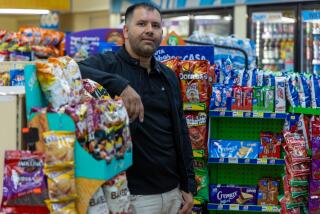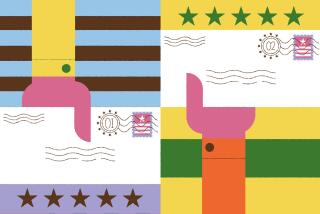‘Brave new Canadian’: Runaway Saudi woman reaches new home
Reporting from Toronto — Tired but smiling, an 18-year-old Saudi runaway who said she feared death if deported back home arrived Saturday in Canada, which had offered her asylum in a case that attracted global attention after she mounted a social media campaign.
“This is Rahaf Alqunun, a very brave new Canadian,” Foreign Minister Chrystia Freeland said arm-in-arm with the Saudi woman in Toronto’s airport.
Rahaf Mohammed Alqunun smiled broadly as she exited an airport arrival door sporting a Canada zipper hoodie and a U.N. High Commissioner for Refugees hat, capping a dramatic week that saw her flee her family while visiting Kuwait, before flying to Bangkok. From there, she barricaded herself in an airport hotel to avoid deportation and tweeted about her situation.
On Friday, Prime Minister Justin Trudeau announced that Canada would accept Alqunun as a refugee. Her situation has highlighted the cause of women’s rights in Saudi Arabia, where several women fleeing abuse by their families have been caught trying to seek asylum abroad in recent years and returned home.
Freeland said Alqunun preferred not to take questions Saturday.
“It was a pleasure for me this morning to welcome her to her new home,” Freeland said. “She is obviously very tired after a long journey and she preferred to go and get settled. But it was Rahaf’s choice to come out and say hello to Canadians. She wanted Canadians to see that she’s here, that she’s well and that she’s very happy to be in her new home.”
Freeland said Alqunun commented about the cold weather and she responded that it gets warmer in Canada.
Alqunun flew to Toronto via Seoul, according to Thai immigration Police Chief Surachate Hakparn. Alqunun tweeted two pictures from her plane seat — one with what appears to be a glass of wine and her passport and another holding her passport while on the plane with the hashtag “I did it” and the emojis showing a plane, hearts, wine glass and flexed arm.
Canada’s decision to grant her asylum could further upset the country’s relations with Saudi Arabia.
In August, Saudi Arabia expelled Canada’s ambassador to the kingdom and withdrew its own ambassador after Canada’s Foreign Ministry tweeted support for women’s right activists who had been arrested. The Saudis also sold Canadian investments and ordered their citizens studying in Canada to leave.
No country, including the U.S., spoke out publicly in support of Canada in that spat with the Saudis. Freeland didn’t address what Alqunun’s case would mean to Saudi relations.
“Canada believes very strongly in standing up for human rights throughout the world. We believe very strongly that woman’s rights are human rights,” Freeland said.
There was no immediate Saudi government reaction, nor any mention of her arrival in state media.
Freeland said the U.N. refugee agency found she was in a dangerous situation in Thailand and that Canada is glad they were able to act quickly to offer her refuge.
Alqunun’s father arrived in Bangkok on Tuesday, but his daughter refused to meet with him.
The office of the U.N. High Commissioner for Refugees welcomed Canada’s decision.
“The quick actions over the past week of the government of Thailand in providing temporary refuge and facilitating refugee status determination by UNHCR, and of the government of Canada in offering emergency resettlement to Ms. Alqunun and arranging her travel were key to the successful resolution of this case,” the agency said in a statement.
Several other countries, including Australia, had been in talks with the U.N.’s refugee agency to accept Alqunun, Surachate said.
“She chose Canada. It’s her personal decision,” he said.
Australian media reported that UNHCR had withdrawn its referral for Alqunon to be resettled in Australia because Canberra was taking too long to decide on her asylum.
“When referring cases with specific vulnerabilities who need immediate resettlement, we attach great importance to the speed at which countries consider and process cases,” a UNHCR spokesperson in Bangkok told the Associated Press in an email reply on condition of anonymity because the person wasn’t authorized to discuss the case publicly.
Canada’s ambassador had seen her off at the airport, where Alqunun thanked everyone for helping her. She plans to start learning more English, though she already speaks it more than passably.
Alqunun was stopped Jan. 5 at Bangkok’s Suvarnabhumi Airport by immigration police who denied her entry and seized her passport.
She barricaded herself in an airport hotel room where her social media campaign got enough public and diplomatic support that Thai officials admitted her temporarily under the protection of U.N. officials, who granted her refugee status Wednesday.
Surachate said her father — whose name has not been released — denied physically abusing Alqunun or trying to force her into an arranged marriage, which were among the reasons she gave for her flight. He said Alqunun’s father wanted his daughter back but respected her decision.
“He has 10 children. He said the daughter might feel neglected sometimes,” Surachate said.
Phil Robertson, deputy Asia director of Human Rights Watch, cited Alqunun’s “courage and perseverance.”
“This is so much a victory for everyone who cares about respecting and promoting women’s rights, valuing the independence of youth to forge their own way, and demanding governments operate in the light and not darkness,” he said in a statement.
More to Read
Sign up for Essential California
The most important California stories and recommendations in your inbox every morning.
You may occasionally receive promotional content from the Los Angeles Times.










